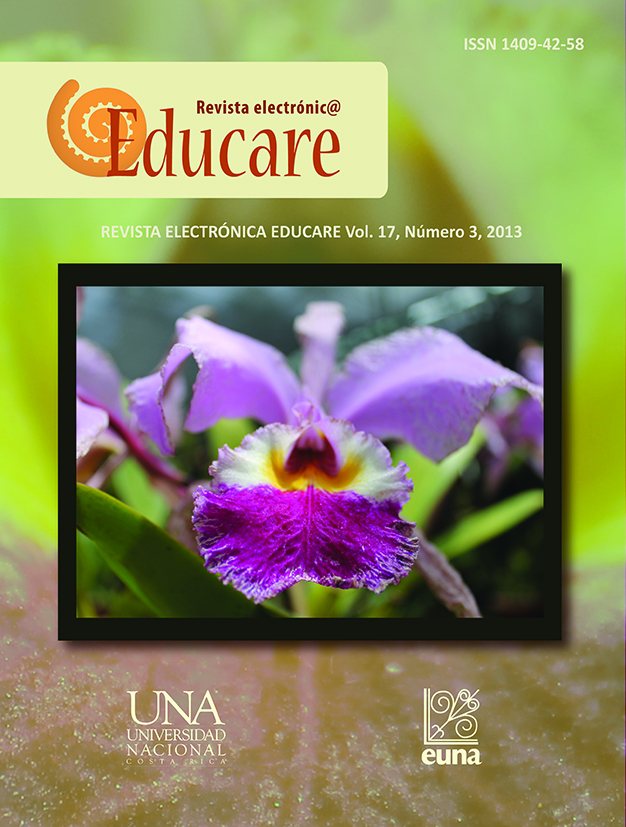Combined Learning (face-to-face/virtual) and the Development of Written Communication Skills
DOI:
https://doi.org/10.15359/ree.17-3.14Keywords:
Combined learning, developing writing skills, digital writing and TIC´s.Abstract
This paper summarizes the results of the research project El aprendizaje combinado (presencial y no presencial apoyado por el uso de internet) y su utilidad para el desarrollo de las habilidades de expresión escrita [The Use of Combined Learning (face-to-face and virtual) in Developing Written Expression Skills] conducted in 2011-2012 with the support of the Office of the Vice-President for Research of the Costa Rica Institute of Technology. This research-action study was focused on exploring and systematizing the contribution of combined learning activities (bimodal courses) to develop written expression skills. Didactic strategies were designed to use forums, wikis, blogs, bibliography managers, concept mapping software, as well as online spelling checkers and dictionaries as means to promote the use of written language in relevant contexts. The total study population included eighty-one students from the University of Costa Rica and the Costa Rica Institute of Technology, and thirteen faculty members (ten were higher education teachers, three were teachers of the Ministry of Public Education of Costa Rica working with students from the 7th to the 11th grades, and there was a teacher working in both contexts). The outcomes of the project were evaluated through the analysis of products selected, panel discussions with the participant teachers, interviews to the participant population, and the analysis of the researcher’s project journals. This study concludes that combined learning contributes to improving written expression skills, since it involves the development of skills and competencies to accomplish different tasks related to the access of knowledge on a specific topic to be developed in writing, text planning, text production, proofreading and dissemination of the final product.
References
Álvarez, T. y Ramírez, R. (2006). Teorías o modelos de producción de textos en la enseñanza y el aprendizaje de la escritura. Didáctica (Lengua y Literatura), 18, 29-60. Recuperado de http://revistas.ucm.es/index.php/DIDA/article/view/DIDA0606110029A/19144
Argüello, B., Mora, L. y Quirós, M. A. (2012). Utilización de las tecnologías de la información y la comunicación para el mejoramiento de la escritura del estudiantado de tercer ciclo de la educación general básica (Tesis de licenciatura inédita). San José, Universidad de Costa Rica.
Coaten, N. (octubre, 2003). Blended e-learning [Aprendizaje combinado]. Educaweb.com, 69. Consultado en http://www.educaweb.com/esp/servicios/monografico/formacionvirtual/1181076-a.html
Henao, O. (2006). Evidencias de la investigación sobre el impacto de las tecnologías de la información y comunicación en la enseñanza de la lecto-escritura. Revista Educación y Pedagogía. 18(44), 71-87. Consultado en http://aprendeenlinea.udea.edu.co/revistas/index.php/revistaeyp/article/viewFile/6073/5479
Marsh II, G. E., McFadden, A. C. y Price, B. J. (Winter, 2003) Blended Instruction: Adapting Conventional Instruction for Large Classes [Aprendizaje combinado: Adaptación de instrucción convencional para grandes clases]. Online Journal of Distance Learning Administration, 6(4). Recuperado de http://www.westga.edu/~distance/ojdla/winter64/marsh64.ht
Sánchez, C. (2005). Los problemas de redacción de los estudiantes costarricenses: Una propuesta de revisión desde la lingüística del texto. Filología y Lingüística, 31(1), 267-295. Recuperado de http://www.vinv.ucr.ac.cr/latindex/rfl-31-1/rfl-31-1-15.pdf
Sandín, M. P. (2003). Investigación culitativa en educación. Fundamentos y tradiciones. Madrid: McGraw-Hill. Recuperado de http://www.postgrado.unesr.edu.ve/acontece/es/todosnumeros/num09/02_05/capitulo_7_de_sandin.pdf
Solano, O. L. (septiembre de 2010). Las posibilidades que brinda el aprendizaje combinado (modalidad presencial y no presencial apoyado por el uso de Internet) para el desarrollo de las destrezas de comunicación escrita. En Congreso Iberoamericano de Educación (pp. 1-15). Buenos Aires, República de Argentina. Recuperado de http://www.chubut.edu.ar/descargas/secundaria/congreso/TICEDUCACION/R1006_Solano.pdf
Tinajero, E. (agosto, 2006). Internet y computadoras en educación: Una visión sociocultural. Apertura: Revista de Innovación Educativa, 6(4), 90-105. Recuperado de http://www.redalyc.org/pdf/688/68800408.pdf
Downloads
Published
How to Cite
Issue
Section
License
1. In case the submitted paper is accepted for publication, the author(s) FREELY, COSTLESS, EXCLUSIVELY AND FOR AN INDEFINITE TERM transfer copyrights and patrimonial rights to Universidad Nacional (UNA, Costa Rica). For more details check the Originality Statement and Copyright Transfer Agreement
2. REUTILIZATION RIGHTS: UNA authorizes authors to use, for any purpose (among them selfarchiving or autoarchiving) and to publish in the Internet in any electronic site, the paper´'s final version, both approved and published (post print), as long as it is done with a non commercial purpose, does not generate derivates without previous consentment and recognizes both publisher's name and authorship.
3. The submission and possible publication of the paper in the Educare Electronic Journal is ruled by the Journal’s editorial policies, the institutional rules of Universidad Nacional and the laws of the Republic of Costa Rica. Additionally, any possible difference of opinion or future dispute shall be settled in accordance with the mechanisms of Alternative Dispute Resolution and the Costa Rican Jurisdiction.
4. In all cases, it is understood that the opinions issued are those of the authors and do not necessarily reflect the position and opinion of Educare, CIDE or Universidad Nacional, Costa Rica. It is also understood that, in the exercise of academic freedom, the authors have carried out a rogorous scientific-academic process of research, reflection and argumentation thar lays within the thematic scope of interest of the Journal.
5. The papers published by Educare Electronic Journal use a Creative Commons License:














 The articles published by Educare Electronic Journal can be shared with a Creative Commons License:
The articles published by Educare Electronic Journal can be shared with a Creative Commons License: 



